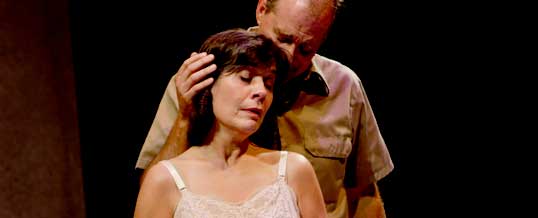
A review of Thalia’s Umbrella’s production of an intensely personal, political play by South African writer Athol Fugard
By Misha Berson, Seattle Times Theater Critic
Playwright Athol Fugard calls the aloe plant “one of South Africa’s most powerful, beautiful and celebratory symbols. It survives out there in the wild when everything else is dried. At the end of one of our terrible recurrent droughts, the aloe is still there.”
In “A Lesson From Aloes,” the title symbolism feels obvious at first as a metaphor for Fugard’s parched but resilient nation. But the 1979 drama, in a stirring production by the Seattle troupe Thalia’s Umbrella at Taproot Theatre, assiduously excavates the layers of hope and rage, fear and guilt that made it so painful to love or leave apartheid-era South Africa.
As in “Master Harold and the Boys” and other works, Fugard here masterfully observes political realities through the magnified lens of deep personal relationships. Wordy, occasionally didactic, but rippling with charged emotion and insight, “Aloes” requires a moment-to-moment attentiveness and articulation from its small cast.
That it receives in full in Daniel Wilson’s close-up staging at Taproot’s black-box Isaac Studio Theatre.
Piet Bezuidenhout (Terry Edward Moore), an Afrikaner long active in the movement against his country’s draconian policies of racial separation, finds rugged beauty and stamina in the potted aloes he tends at his home near Port Elizabeth. Watching him putter in a sunny courtyard, his perturbed wife, Gladys (Pam Nolte), considers the species harsh and ugly.
Piet’s old friend and longtime political comrade Steve Daniels (William Hall Jr.) sees only thorns in the spiky native foliage, understandably. As a black activist, he has been imprisoned and ruthlessly interrogated by the white government. Deprived of his livelihood, he sees no alternative but to move with his family (without hope of return) to England.
Though such oppression long persisted in South Africa, before the 1990 release of opposition leader Nelson Mandela and nullification of apartheid, “A Lesson From Aloes” is pointedly set in the 1960s, at a turning point for the resistance movement.
In 1960, police opened fire on a large demonstration in Sharpeville, killing 69 black protesters. A subsequent government crackdown led to arrests, jailings and bannings of many black leaders, and some white allies. The utopian dream of a successful, nonviolent, interracial revolution shattered.
“We were like a bunch of Boy Scouts playing at politics,” declares Steve, in a fraught farewell visit to the Bezuidenhouts. “Tell me one thing we’ve achieved that makes it worth staying here and messing up my children’s lives the way I did mine.”
But tyranny leaves no life unscathed. The play also gauges, in searing detail, the victimization of gentle, poetry-quoting but isolated Piet, and of apolitical Gladys, whose emotional grip tightens and dangerously loosens throughout the play.
The white couple’s marriage has inevitably suffered: They are in exile from one another, coexisting on a bed of eggshells, and further threatened by questions that arise about Piet’s loyalty to the cause.
Hall and Moore navigate this territory (and the required accents) well, and are no strangers to it. This is Hall’s third production of “Aloes,” and both actors appeared in Book-It Theatre’s “Cry, the Beloved Country,” as ministers who bond across the racial divide in 1940s South Africa. The two are in excellent form here, with Moore ably shouldering the heftier, more subtle load of Piet’s tenderness and quiet suffering.
Nolte has an even more challenging assignment, and apart from some minor lapses into histrionics, she gives a finely shaded portrait of a woman desperately trying to reclaim her sanity and identity.
Though apartheid is now a thing of the past, plays like “Aloes” do not fade with single regime changes. The deep damage a vicious system inflicts on individuals is apparent in many parts of this world. And as Fugard says, “How one human being deals with another remains the most critical fact in history.”
OCT
2014

About the Author:
Terry has acted and/or directed for most of the professional theaters in the Pacific Northwest, including ACT, Seattle Repertory Theatre, 5th Avenue, and Intiman, and from coast to coast. After an unsettling recent role—as a serial killer in A Shade of Green at Theatre 9/12—he was apparently so convincing (check out this review) that no one had the courage to hire him for months after. So he decided to start his own theater.